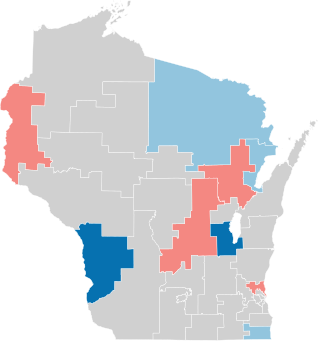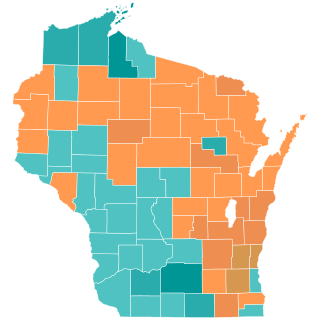
Dave Hansen is an American Democratic politician and former state legislator. He was a member of the Wisconsin State Senate from 2001 through 2021, representing the 30th senatorial district.

Robert W. Wirch is an American Democratic politician from Kenosha County, Wisconsin. He is a member of the Wisconsin Senate, representing Wisconsin's 22nd Senate district since 1997. He previously served two terms in the Wisconsin State Assembly, from 1993 to 1997, and served on the Kenosha County Board of Supervisors before that.

Scott Kevin Walker is an American politician who served as the 45th governor of Wisconsin from 2011 to 2019. A member of the Republican Party, he previously served as Milwaukee County executive from 2002 to 2010.
The administrative divisions of Wisconsin include counties, cities, villages and towns. In Wisconsin, all of these are units of general-purpose local government. There are also a number of special-purpose districts formed to handle regional concerns, such as school districts.
Francis Thomas Ament was the fourth Milwaukee County Executive, serving from 1992 until his resignation in 2002 amid a county pension scandal. Ament had served as chairman of the Milwaukee County Board of Supervisors from 1976 to 1992.

Robin Joseph Vos is an American businessman and Republican politician and the 79th speaker of the Wisconsin State Assembly, serving in that role since 2013. He has been a member of the Assembly since 2005, representing most of the southern half of Racine County. Vos is also president of the National Conference of State Legislatures.
Van H. Wanggaard is a Republican politician and former law enforcement officer. He is a member of the Wisconsin State Senate, representing Racine and Kenosha counties since January 5, 2015. He was previously elected to the same office in 2010, but was removed by recall election in June 2012.

The 2011 Wisconsin protests were a series of demonstrations in the state of Wisconsin in the United States beginning in February involving as many as 100,000 protesters opposing the 2011 Wisconsin Act 10, also called the "Wisconsin Budget Repair bill." The protests centered on the Wisconsin State Capitol in Madison, with satellite protests also occurring at other municipalities throughout the state. Demonstrations took place at various college campuses, including the University of Wisconsin–Madison and the University of Wisconsin–Milwaukee. After the collective bargaining bill was upheld by the Wisconsin Supreme Court on June 14, the number of protesters declined to about 1,000 within a couple days.

In February 2011, a series of public employee protests began in the United States against proposed legislation which would weaken the power of labor unions. By March, eighteen states had proposed legislation which would remove some collective bargaining powers from unions, along with another five states which proposed legislation which would negatively affect unions. The protests occurred when public employee unions mounted protests against legislation proposed by Republican governors such as Scott Walker (Wisconsin), Rick Scott (Florida), Mitch Daniels (Indiana), Sean Parnell (Alaska), Rick Snyder (Michigan), John Kasich (Ohio), Paul LePage (Maine) and Jan Brewer (Arizona) which, among other things, would strip public employees of some collective bargaining rights as well as require higher employee contributions to pension and health care plans. The governors stated they needed these changes in order to cut state spending and balance the states' budgets. The protests began in Wisconsin, then spread to Indiana and Ohio, with unions around the country rallying to show their opposition to the proposed legislation. Several other states considered similar legislation. Virginia, North Carolina, and Texas prohibit formal collective bargaining with public employees.

The 2011 Wisconsin Act 10, also known as the Wisconsin Budget Repair Bill, is legislation proposed by Republican Governor Scott Walker and passed by the Wisconsin Legislature to address a projected $3.6 billion budget deficit. The legislation primarily affects the following areas: collective bargaining, compensation, retirement, health insurance, and sick leave of public sector employees. In response, unions and other groups organized protests inside and around the state capitol. The bill was passed into law and became effective as of June 29, 2011. Public employees exempt from the changes to the collective bargaining law include firefighters and most law enforcement workers. The bill was ruled to be constitutional by the Wisconsin Supreme Court in July 2014, after three years of litigation.

Recall elections for nine Wisconsin state senators were held during the summer of 2011; one was held on July 19, and six on August 9, with two more held on August 16. Voters attempted to put 16 state senators up for recall, eight Democrats and eight Republicans, because of the budget bill proposed by Governor Scott Walker and circumstances surrounding it. Republicans targeted Democrats for leaving the state for three weeks to prevent the bill from receiving a vote, while Democrats targeted Republicans for voting to significantly limit public employee collective bargaining. Scholars could cite only three times in American history when more than one state legislator has been recalled at roughly the same time over the same issue.

The Wisconsin Supreme Court election of 2011 took place on Tuesday, April 5, 2011. The incumbent justice, David Prosser, Jr., was re-elected to another ten-year term, defeating assistant Wisconsin Attorney General JoAnne Kloppenburg. Unlike past elections for the Wisconsin Supreme Court, the race gained significant nationwide publicity as it was widely seen as the first referendum on Wisconsin Governor Scott Walker's proposed anti-union legislation and the resulting protests.

The 2012 Wisconsin gubernatorial recall election was a special election to elect the governor and lieutenant governor of Wisconsin. It resulted in voters re-electing incumbent Republican governor Scott Walker over the Democratic candidate Tom Barrett by a larger margin than he had in 2010, in which Walker had also faced Barrett. Recall organizers opposed Walker's agenda, particularly his limiting of collective bargaining rights for state employees and they collected over 900,000 signatures to initiate the recall election process. There was also a recall for Lieutenant Governor Rebecca Kleefisch. She won her race, defeating Democrat Mahlon Mitchell, making her the first lieutenant governor to run in and survive a recall.

Recall elections for four Wisconsin state senators were held during the spring of 2012. Voters put four state senators up for recall, all Republicans, because of the budget repair bill proposed by Governor Scott Walker and circumstances surrounding it. Democrats targeted Republicans for voting to significantly limit public employee collective bargaining. Scholars could cite only four times in American history when more than one state legislator has been recalled at roughly the same time over the same issue. The recall elections occurred on June 5, with May 8 being the date of the primary election.

The 2014 Wisconsin Fall General Election was held in the U.S. state of Wisconsin on November 4, 2014. Wisconsin's Governor, Lieutenant Governor, Attorney General, Secretary of State, and State Treasurer were all up for election, as well as Wisconsin's eight seats in the United States House of Representatives. The November general election in 2014 also featured a statewide referendum on an amendment to the Constitution of Wisconsin. The 2014 Wisconsin Fall Primary Election was held on August 12, 2014.
A recall election in the state of Wisconsin is a procedure by which voters can remove an elected official from office through a direct vote before his or her term has ended.

The 2018 Wisconsin Fall General Election was held in the U.S. state of Wisconsin on November 6, 2018. All of Wisconsin's partisan executive and administrative offices were up for election as well as one of Wisconsin's U.S. Senate seats, Wisconsin's eight seats in the United States House of Representatives, seventeen seats in the Wisconsin State Senate, and all 99 seats in the Wisconsin State Assembly. The 2018 Wisconsin Fall Partisan Primary was held August 14, 2018. There were also special elections held during 2018 for three State Assembly seats and two state senate seats.

The 2020 Wisconsin Fall General Election was held in the U.S. state of Wisconsin on November 3, 2020. All of Wisconsin's eight seats in the United States House of Representatives were up for election, as well as sixteen seats in the Wisconsin State Senate and all 99 seats in the Wisconsin State Assembly. Voters also chose ten electors to represent them in the Electoral College, which then participated in selecting the president of the United States. The 2020 Fall Partisan Primary was held on August 11, 2020.
Supreme Moore Omokunde is an American community organizer and Democratic politician from Milwaukee, Wisconsin. He has also been known by the names Sowande Ajumoke Omokunde and Supreme Solar Allah. He is a member of the Wisconsin State Assembly, representing Wisconsin's 17th Assembly district since 2021. He was also a member of the Milwaukee County Board of Supervisors from 2015 through 2020.

The 2000 Wisconsin Fall General Election was held in the U.S. state of Wisconsin on November 7, 2000. One of Wisconsin's U.S. Senate seats was up for election, as well as Wisconsin's nine seats in the United States House of Representatives, the sixteen even-numbered seats in the Wisconsin State Senate, and all 99 seats in the Wisconsin State Assembly. Voters also chose eleven electors to represent them in the Electoral College, which then participated in selecting the president of the United States. The 2000 Fall Partisan Primary was held on September 12, 2000.










